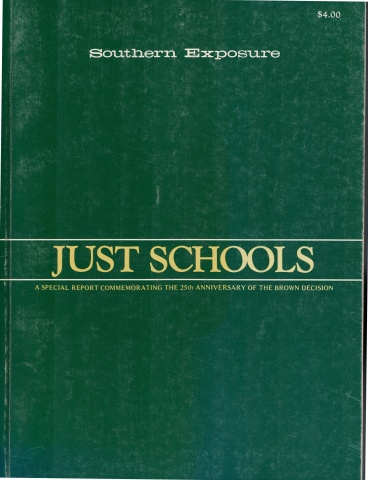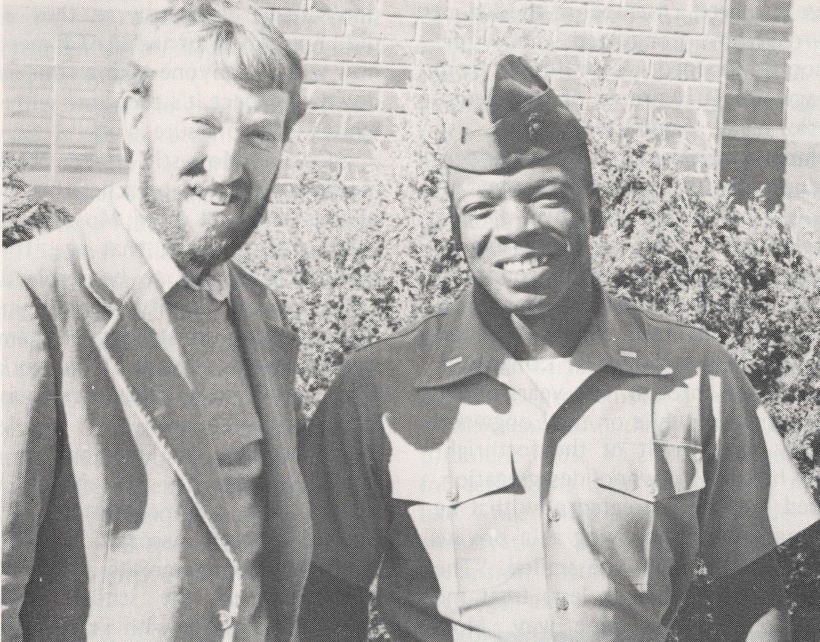
This article originally appeared in Southern Exposure Vol. 7 No. 2, "Just Schools: A Special Report Commemorating the 25th Anniversary of the Brown Decision." Find more from that issue here.
The following article contains anti-Black racial slurs.
I had a nigger schoolteacher in 1967, when I was a tenth-grader at LaFayette High School in Chambers County, Alabama. That was my first experience with desegregation, and one of the things I remember best about it is that somehow in the course of that year the nigger teacher stopped being a nigger and became just a teacher.
It was no small achievement, and she paid a steep emotional price; maybe there were other reasons, but she didn't return the next year.
Many white students did what they could to make Miss Oliver's life miserable, especially at the start, and I was among them. I don't think we meant it personally. But she was black and this was a white school, regardless of what any judge said, and she wasn't supposed to be there.
So what if this was a full decade after desegregation began elsewhere across the South? Our town was small and slow to change and it was, as far as I and my classmates could see, untouched by the civil rights movement. About half its 3,500 people were black, but except for the workplace and the market place, all life was neatly divided.
Even when work brought whites and blacks together, there were dividers. I worked summers on a dairy farm alongside a black teenager named Lewis Ware. We laughed and joked and played together in the fields, but when the hay was in the barn he went home to his world and I went home to mine. If I saw Lewis uptown, I would wave and speak, but then I might turn to my friends and say, "Oh, that's Lewis, one of the niggers I work with."
What stood between Lewis and me were custom and training, the same barriers which caused half a school year to go by before I could see my black schoolteacher as an individual. The difficulty wasn't mine alone. She told me later that year, "The first time I saw you I didn't think you had sense enough to write your own name." She was referring not entirely to my physiognomy, but to the circumstances of the first time she literally saw me, which was from the bottom of a pile of hooting and guffawing boys who had spilled from a closet in the back of the classroom. We had been hiding in the closet so that when she entered the room and began to call the class roll, we could answer "here" from inside the closet. It was both a joke and the calculated first step in a series of petty harassments intended to drive her from our school.
Fortunately, most of us were educable, and she was a strong woman and a good teacher. She won some of her students over with her patience and what came to be acknowledged as courage; she won others by absorbing them in the history she taught; mostly she won by simply holding on until her white students got to know her. It was a gradual process but by the end of the year all but a very few of her students had stopped baiting her. And that was progress.
I honestly don't know whether school desegregation in LaFayette made any difference educationally, but it did let many black and white students get to know each other on a level more real than we had known before.
Of course, some parents never gave their children that chance. By the time I was a senior, a private academy had been established in LaFayette and it drew white students, first in a trickle and then a flood, away from public schools. Today, the student body at LaFayette High School is only a little more than 10 percent white.
The private school was called Chambers Academy. Its boosters talked about quality education and keeping up standards. But the new school chose "the Rebels" as its official nickname, gray as the school colors, and the Stars and Bars of the Confederacy as the school flag. The lines seemed clearly drawn then, and for many whites in the LaFayettes of the South, they still are. But during that period, school desegregation helped me make the same individual discoveries about people and about race that were being made by - or had already been made by - many other white Southerners.
It was only a symbol, but the word "nigger" disappeared from my vocabulary in 1967. Others haven't learned that lesson and some never will. Even in my immediate family for instance, the word is commonly used; to avoid making trouble, I simply ignore it. I recently went back to LaFayette to conduct some interviews and I found that many whites - with one significant exception – still use the term casually and, in most cases, unselfconsciously. The excepttion: the white students I interviewed at the public high school.
There are seeds of hope there.
Rudolph Copeland and Randall Williams were seniors in the first fully desegregated class at LaFayette High School. The year was 1969. A decade later, the two met to discuss school integration in their home town. The interview was recorded at Camp LeJeune, North Carolina, where Copeland is a lieutenant in the U.S. Marine Corps. Williams also lives in North Carolina, at Chapel Hill, where he is a staff member of the Institute for Southern Studies.
RW: Desegregation came to us a lot later than in most other places. We had had a handful of black students at LaFayette High since about 1967 under the so-called freedom-of-choice plan. Then the year we were seniors, they put our two schools together. What did you expect to find?
RC: First, it's important that other parts of the country had integrated earlier and that a few black students had gone to LaFayette High before the majority came. Most of us at Chambers County Training School were getting saturated with the news from the rest of the country. Plus, we were getting feedback from the few who went over to LaFayette High as to how it really was. We would ask them, "Are they smart, are they good athletes, how did they treat you?" So we kind of knew what to expect. In high school at that time, of course, the big thing was sports and everybody was concerned with how the integration thing was going to affect his particular job performance. I remember I was the quarterback at our school and I was wondering, "Hey, if we integrate, I wonder what position will I get?" I knew there would be all kinds of opposition to my being quarterback at LHS.
RW: One thing we white students were very much aware of at the time was that you were coming to our school. We were letting you in, so to speak. What did you think about that?
RC: We didn't really want to go, for one thing. Again, we had just revamped our athletic program, this was our senior year - we thought, "Hey, let the next group go, I don't want to go." But any kind of change is going to be like that. Nobody wants to be the first to do something they're not sure of. We didn't know what your reaction was going to be, we didn't even know what our reaction was going to be. I think that overall it went very smoothly, much more smoothly than was expected.
RW: I look back at where blacks and whites stood in terms of leadership roles, and I was looking in the yearbook at the picture of the class officers, without a single black representative and I remembered how we deliberately excluded you there by holding the elections the previous spring - when you people weren't even in our school.
RC: I know.
RW: Looking back at that I feel guilty as hell but we did it deliberately. We were thinking, we're going to fix this, we'll settle this by electing our class officers before they get here. And you knew that?
RC: Right. We expected that, but what could we do about it? Why cause so much hell about it? Everybody knew that had been done in the past, so all we could have done was to have said that the elections were illegitimate and should be done over, which wouldn't have happened and would have made things a lot more antagonistic. It just didn't emerge as a serious consideration. But I do remember thinking I should have been given a chance at quarterback. One game the starting quarterback got injured and I went in and we scored two touchdowns. I thought, "Gee, coach, what kind of evidence do you want?" I couldn't understand that. So there was that kind of syndrome. I thought, well, maybe he won't let me do it because he's afraid I 'II do it better.
RW: Of course, black athletes were welcomed on the playing field in ways that they weren't elsewhere. We used to have these little post-game parties and they continued after the merger, too, but they were very informal then and blacks were just not notified. You must have known about that and maybe you had parties of your own. There were a couple of exceptions. Donna Ramage's (now an eighth-grade English teacher at LaFayette High) parents invited the whole team out one night. But generally there was a reluctance on that point, mostly on the part of the parents. There was a social line that the parents were unwilling to cross or to let us cross.
RC: Oh yes, we knew all about that. I don't think we had a prom that year, either.
RW: Well, actually, Rudy, we did have one, but you weren't invited.
RC: Okay. Well, you see, there it is. But we expected that kind of stuff and I don't think it was surprising. Why should it be? Right now it might be different.
RW: But it must have been disappointing.
RC: It's disappointing when you expect something, when you've been doing something and can't do it anymore. But when you've never done it and you can't do it, that's different. It was clear that we weren't going to be included in some things.
RW: But looking at the situation in LaFayette, it doesn't seem that there has been that much progress. Now the school system is mostly black, there are no mixed civic clubs, no blacks in elective office, the list could go on and on.
RC: That's a reflection of the community. If I live on this side of town and you live on that side of town, there's really no cause for us to get together. It's the same for blacks who live on one side of town and those who live on the other. No interaction. So interaction of that kind has to be built around some medium where people can be and not feel threatened and uncomfortable. But as long as there is no medium, you're never going to have progress. And school was definitely a medium for us.
Tags
Randall Williams
Randall Williams is a fugitive staff member of the Institute for Southern Studies. He is currently living and working in north Georgia, where he is guiding the start-up of two weekly newspapers, the Chickamauga Journal and the Lafayette Gazette. (1980)
Randall Williams is an Alabama native, a journalist and former editor of the Southern Poverty Law Center’s newsletter. He is now on the staff of the Institute for Southern Studies. (1978)

